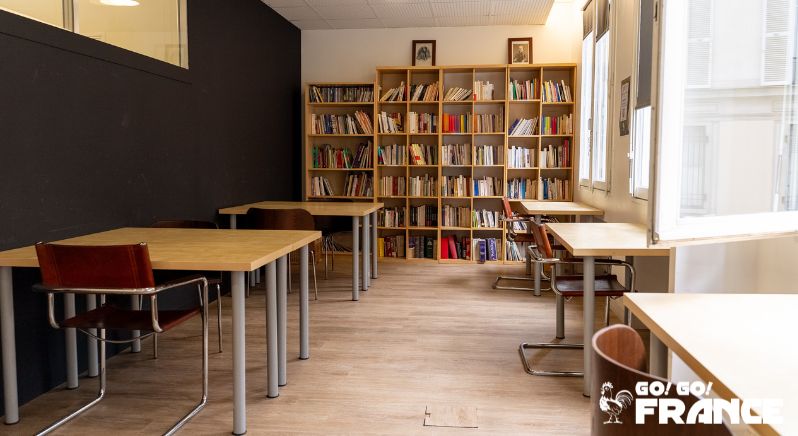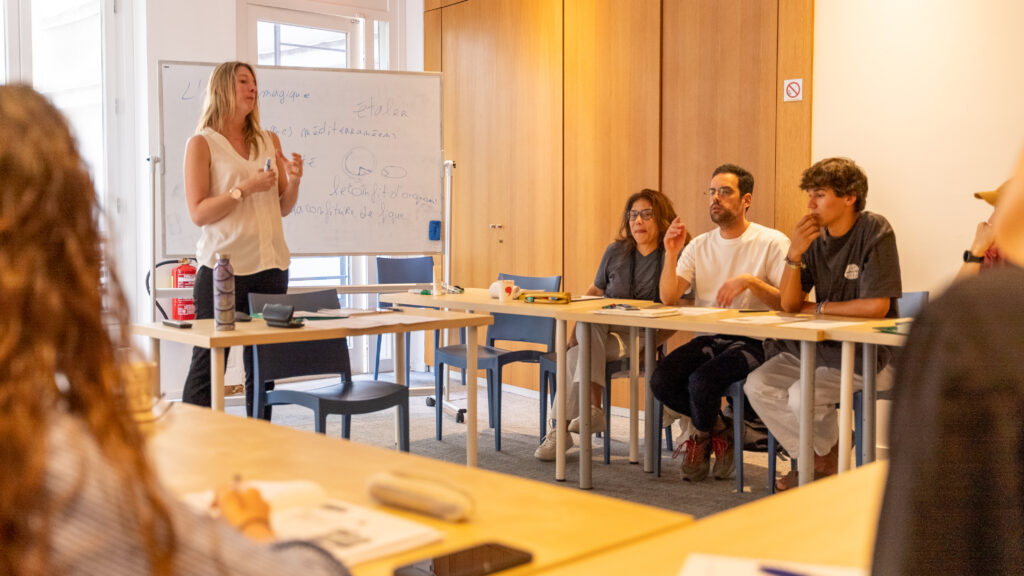Deciding to study abroad is a significant step, and when it comes to learning French in France, the importance of selecting the ideal language school cannot be overstated. This decision involves many personal factors and what is right for someone else might not be right for you. Don’t worry, we are here to help you choose the right French language school.
Set Clear Objectives
The cornerstone of any successful endeavour is goal setting. Establishing specific, achievable objectives is vital for language learners. These goals act as your compass, keeping you focused and motivated through challenging periods.
Now, think about what you ultimately want to achieve with your time in France and this will help you choose the right French language school. For example, if you want to move on to higher education after your language studies, then it makes sense to sign up for a school that offers a university pathway program. If you want to find a full-time job after completing your studies, or even a part-time job or internship during your studies, then you might want to study at a school that provides career support services.

Assess Your Budget
Education costs money. Tuition fees vary by school and program duration. However, living expenses such as housing, utilities, food, transportation, and more also play a significant role in your budget planning.
The French government requires proof of financial means for student visa applicants, which is typically around €615 per month. This amount is equivalent to the basic monthly maintenance allowance paid to French government scholarship holders in France and is considered the minimum required to live comfortably. However, we advise saving as much as possible.
You can learn more about the financial requirements to study in France here: https://stg-gogofrance-ggfstaging.kinsta.cloud/en/blog/financial-requirements-for-studying-in-france/
Location Matters
Your choice of city can significantly impact your budget and overall experience. France offers a diverse range of locales, from vibrant Paris to the serene countryside of Provence. Go! Go! France works with more than 10 schools across France and each city or region has its own personality, unique lifestyle and cost of living, so it’s important to choose one that best suits you.
Paris is big and exciting and there is always something to do. But it is also the most expensive city in France to live in. It might also be a less enjoyable experience for people who don’t like big cities and it may be harder to feel connected with the local community. Consider smaller cities if you seek a blend of urban life and close-knit community vibes. Cities like Lyon, Bordeaux, and Toulouse offer rich cultural experiences without the hustle of Paris.
You should also take into account the location of the school itself in the city, since some schools are closer to public transport than others.

Duration and Start Dates
Reflect on the duration of your study. Students can decide the exact number of weeks they would like to study and general language programs typically start from 1 week. Depending on your starting level (see CEFR levels) and your ultimate goal, you will stay more or less longer at school. Of course, this will also depend significantly on your commitment to studying, attending class, doing your homework and improving your language skills outside of class.
If you are curious to know how long it takes to learn French, read our article here: https://stg-gogofrance-ggfstaging.kinsta.cloud/en/blog/how-long-to-learn-french/
Also, you need to reflect on when to start your studies. French classes typically start every Monday of the year to accommodate as many student schedules as possible. However, complete beginners are usually required to start on specific dates. Depending on the schools, terms for complete beginners can start from every first Monday of the month to only 4 terms available per year on specific dates.
For more information on how language school terms work, please read our article here: https://stg-gogofrance-ggfstaging.kinsta.cloud/blog/how-french-language-school-terms-work/
Study Intensity
Language immersion can be demanding. Select a school that matches your learning pace and availability, especially if you plan to work part-time.
Most schools offer group classes starting at 20 lessons per week, which is considered standard intensity. However, this pace can already feel intensive for some students, with each lesson lasting around 45 to 50 minutes on average. As you increase the intensity, the number of lessons per week will also rise. Students can opt for paces such as 25 lessons per week (medium intensity) or 30 lessons per week or more (high intensity).
In general, high-intensity programs are suited for those aiming for rapid progress, while standard or medium-intensity programs offer a more balanced approach, allowing for a work-study balance and more free time.
For more information on how French lessons work, please read our article here: https://stg-gogofrance-ggfstaging.kinsta.cloud/blog/how-french-lessons-in-france-work/
Accreditation and Quality
Ensure the school’s accreditations and labels are relevant and awarded by French education authorities. This guarantees quality education and recognition of your studies.
There are several accreditations and labels you should be aware of, and their meanings are explained in this article: https://stg-gogofrance-ggfstaging.kinsta.cloud/en/blog/french-school-accreditations-and-labels/

School Facilities
Think about your study environment. Is it important to you to have a modern learning environment? A student lounge or cafeteria? A library where you can study and read French books? Large classrooms? Regular cultural activities? Determine which facilities align with your preferences and learning style.
Choose the right French language school for you
Ultimately, the final choice depends on many different factors and the decision is personal to you. If you trying to choose the right French language school for you, please try weighing the different factors from your learning goals to your budget and lifestyle, and try confronting the pros and cons. Take your time to research and if you need advice or help with your options, feel free to contact our team.











